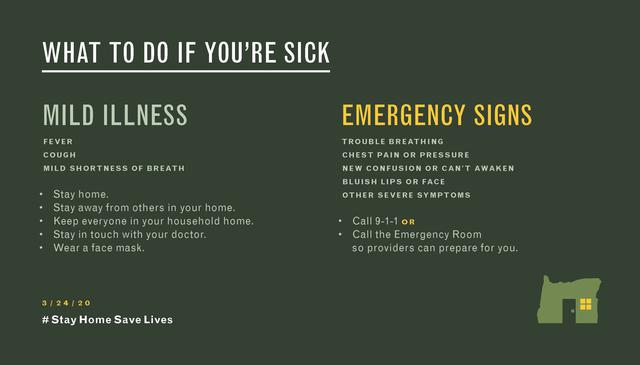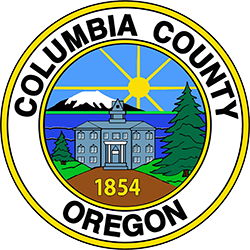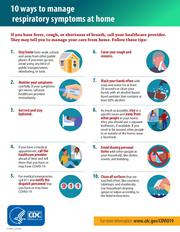What To Do If You Are Sick
PLEASE DON'T TRY COVID-19 REMEDIES SUGGESTED ON SOCIAL MEDIA. MANY ARE HARMFUL. SCIENTISTS ARE TESTING POTENTIAL MEDICATIONS, BUT NOTHING IS APPROVED YET FOR COVID-19.

If you have a fever or cough, you might have COVID-19. Most people have mild illness and are able to recover at home→. Keep track of your symptoms. If you have an emergency warning sign→ (including trouble breathing), get medical attention right away.
WHAT TO DO IF YOU HAVE SYMPTOMS AND ARE WORRIED ABOUT CORONAVIRUS (COVID-19)→
Stay home except to get medical care
- Stay home: People who are mildly ill are able to isolate at home during their illness. You should restrict activities outside your home, except for getting medical care.
- Do not seek medical care unless you already would for severe symptoms.
- Avoid public areas:Do not go to work, school, or public areas.
- Avoid public transportation: Avoid using public transportation, ride-sharing, or taxis.
Oregon Health Authority: COVID-19 Testing Basics
Separate yourself from other people and animals in your home
- Stay away from others: As much as possible, you should stay in a specific room and away from other people in your home. Also, you should use a separate bathroom, if available.
- Limit contact with pets & animals: You should restrict contact with pets and other animals while you are sick, just like you would around other people. Although there have not been reports of pets or other animals becoming sick with COVID-19, it is still recommended that people sick limit contact with animals until more information is known about the virus.
- When possible, have another member of your household care for your animals while you are sick. If you are sick with COVID-19, avoid contact with your pet, including petting, snuggling, being kissed or licked, and sharing food. If you must care for your pet or be around animals while you are sick, wash your hands before and after you interact with pets. See COVID-19 and Animals for more information.
Call ahead before visiting your doctor
- Call ahead: If you have a medical appointment, call the healthcare provider and tell them your symptoms. This will help the healthcare provider’s office determine whether you need to be tested for COVID-19.
- Don't have health insurance? Find out if you are eligable for OHP here.
Wear a facemask if you are sick
- If you are sick: You should wear a facemask when you are around other people (e.g., sharing a room or vehicle) or pets and before you enter a healthcare provider’s office.
- If you are caring for others: If the person who is sick is not able to wear a facemask (for example, because it causes trouble breathing), then people who live with the person who is sick should not stay in the same room with them, or they should wear a facemask if they enter a room with the person who is sick.
Cover your coughs and sneezes
- Cover: Cover your mouth and nose with a tissue when you cough or sneeze.
- Dispose: Throw used tissues in a lined trash can.
- Wash hands: Immediately wash your hands with soap and water for at least 20 seconds or, if soap and water are not available, clean your hands with an alcohol-based hand sanitizer that contains at least 60% alcohol.
Clean your hands often
- Wash hands: Wash your hands often with soap and water for at least 20 seconds, especially after blowing your nose, coughing, or sneezing; going to the bathroom; and before eating or preparing food.
- Hand sanitizer: If soap and water are not readily available, use an alcohol-based hand sanitizer with at least 60% alcohol, covering all surfaces of your hands and rubbing them together until they feel dry.
- Soap and water: Soap and water are the best option if hands are visibly dirty.
- Avoid touching: Avoid touching your eyes, nose, and mouth with unwashed hands.
Avoid sharing personal household items
- Do not share: You should not share dishes, drinking glasses, cups, eating utensils, towels, or bedding with other people or pets in your home.
- Wash thoroughly after use: After using these items, they should be washed thoroughly with soap and water.
Clean all “high-touch” surfaces everyday
- Clean and disinfect: Practice routine cleaning of high touch surfaces.
High touch surfaces include counters, tabletops, doorknobs, bathroom fixtures, toilets, phones, keyboards, tablets, and bedside tables.
- Disinfect areas with bodily fluids: Also, clean any surfaces that may have blood, stool, or body fluids on them.
- Household cleaners: Use a household cleaning spray or wipe, according to the label instructions. Labels contain instructions for safe and effective use of the cleaning product including precautions you should take when applying the product, such as wearing gloves and making sure you have good ventilation during use of the product.
Monitor your symptoms
- Seek medical attention: Seek prompt medical attention if your illness is worsening (e.g., difficulty breathing).
- Symptoms and Testing: The CDC has created a new self assessment tool for the public to determine if they need to see a medical provider. NEW symptoms self checker tool→
- Call your doctor: Before seeking care, call your healthcare provider and tell them your symptoms.
- Wear a facemask when sick: Put on a facemask before you enter the facility. These steps will help the healthcare provider’s office to keep other people in the office or waiting room from getting infected or exposed.
- Alert health department: Ask your healthcare provider to call the local or state health department. Persons who are placed under active monitoring or facilitated self-monitoring should follow instructions provided by their local health department or occupational health professionals, as appropriate.
Discontinuing home isolation
- Stay at home until instructed to leave: Patients with confirmed COVID-19 should remain under home isolation precautions until the risk of secondary transmission to others is thought to be low.
- Talk to your healthcare provider: The decision to discontinue home isolation precautions should be made on a case-by-case basis, in consultation with healthcare providers and state and local health departments.
Resources
CDC What To Do If You Get Sick→
CDC Caring for Someone Sick At Home→
It is also important to keep your body resilient:
- Eat a healthy diet.
- Exercise.
- Get plenty of rest.
- Stay up-to-date on routine vaccines. This includes the flu vaccine. It is not too late to get a flu shot to protect yourself from the flu, which continues to cause illness in Oregon.
- Quit smoking and vaping. Initial research shows that people who smoke may be more likely to develop serious complications from COVID-19. If you'd like to quit, free help is available at 1-800-QUIT-NOW or www.quitnow.net/oregon.
- Stay Home and travel only for essential activities that cannot be conducted remotely.
General Information
Administrator
Monday - Friday
8:30 a.m. to 4:30


